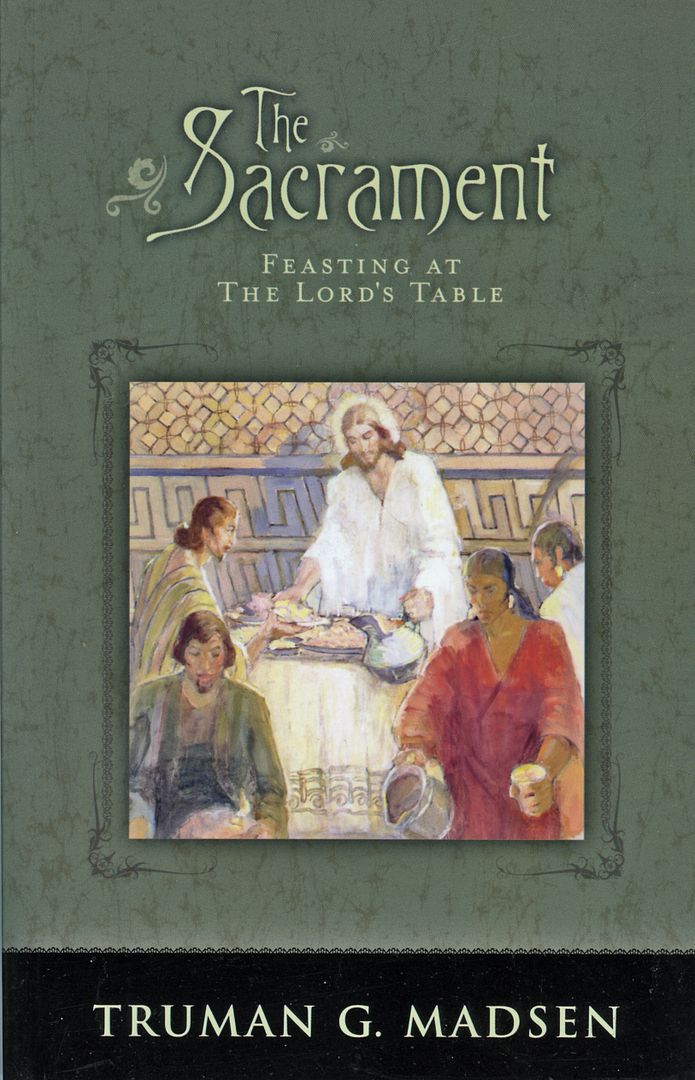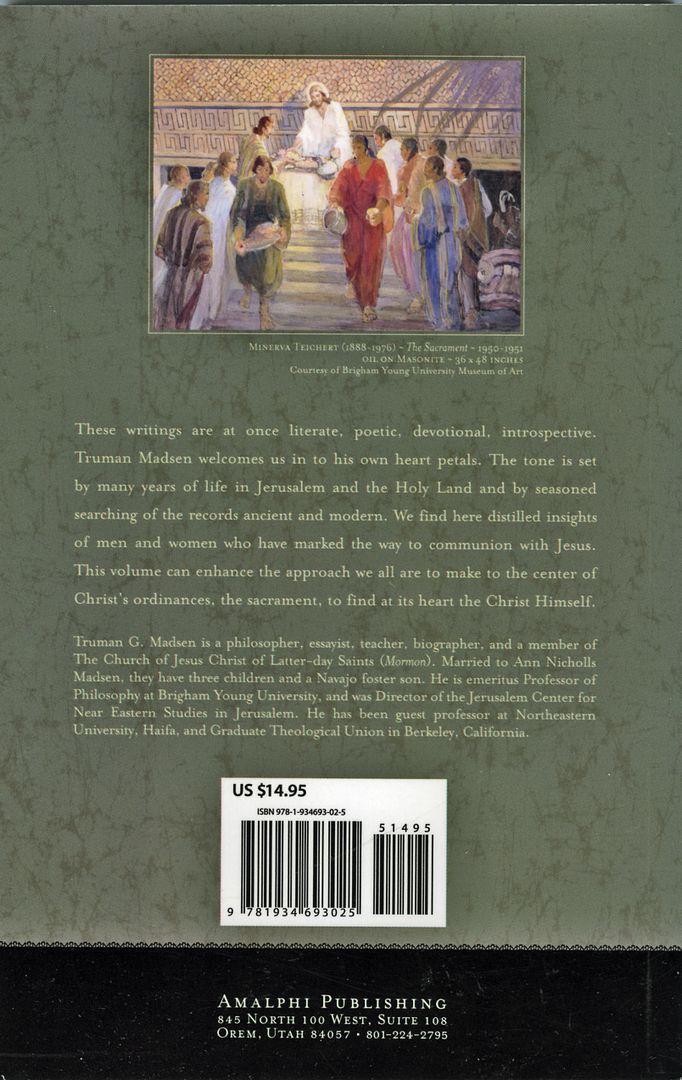scholarship, devotion and joy!
The Sacrament: Feasting at the Lord's Table, by Truman G. Madsen. The author, who was born in 1926 and died only a year ago, on 28 May 2009, was emeritus professor of philosophy and religious studies at Brigham Young University in Provo, Utah and director of the Jerusalem Center for Near Eastern Studies. In addition to his scholarly pursuits, Truman Madsen served in many callings in the Church of Jesus Christ of Latter-day Saints, including ward bishop, stake president and stake patriarch. The LDS Church long has had a worldwide presence, but during the earlier part of Brother Madsen's life it still was something of a Wasatch Front, Utah phenom. With the exception of the exceptionally ecumenical Christian Churches-Disciples of Christ, like the other church bodies that evolved from the various 19th century restoration movements, the LDS Church has not been involved in ecumenical dialogue though it regularly cooperates with other churches and church-related entities in humanitarian endeavors and responses. As you can read in the biography I linked to (but that does not chronicle his passing, so needs to be updated), geographically, intellectually and spiritually Truman Madsen's own world grew and flourished far beyond basic Utah Mormonism, making this a book I imagine even a completely unchurched person could enjoy. And they might be astonished at the depth, breadth, inclusiveness and un-preachiness of this book by a passionately committed follower of Jesus Christ!
 I love the content and the format; each of the ten chapters relates to different aspects of the Lord's Supper—Atonement, The Prayers, Sabbath, Fasting, Glimpses Beyond are some topics. Within each chapter there are a dozen or more sub-topics, each a single page or less. The titles ring like poetry...listen to: How Long Is an Hour? Why Not "Thy Kingdom Come?" Holiness and the Name; The Word "Always" and the Rock; Inspired Introspection; The Lower Part of the Inner Court; A Time to Trust the Silence; Invincible Gratitude; Of Union and Surroundment; Of Pistachio Oil; Can the Spirit Enter a Stone? My Power Lieth Beneath; On Beauty and Overcoming... In the preface the author points out about The Sacrament: Feasting at the Lord's Table "There is no fixed beginning or end. It need not be read in sequence, but can be 'dipped into' at random." An unusual feature for this type of book is the alphabetical topical index at the end. Similar to mudhouse sabbath this is more of a handbook than something you'd tend to read cover-to-cover, though for sure it is engaging enough to be read straight through.
I love the content and the format; each of the ten chapters relates to different aspects of the Lord's Supper—Atonement, The Prayers, Sabbath, Fasting, Glimpses Beyond are some topics. Within each chapter there are a dozen or more sub-topics, each a single page or less. The titles ring like poetry...listen to: How Long Is an Hour? Why Not "Thy Kingdom Come?" Holiness and the Name; The Word "Always" and the Rock; Inspired Introspection; The Lower Part of the Inner Court; A Time to Trust the Silence; Invincible Gratitude; Of Union and Surroundment; Of Pistachio Oil; Can the Spirit Enter a Stone? My Power Lieth Beneath; On Beauty and Overcoming... In the preface the author points out about The Sacrament: Feasting at the Lord's Table "There is no fixed beginning or end. It need not be read in sequence, but can be 'dipped into' at random." An unusual feature for this type of book is the alphabetical topical index at the end. Similar to mudhouse sabbath this is more of a handbook than something you'd tend to read cover-to-cover, though for sure it is engaging enough to be read straight through.The book is full of fascinating scholarly morsels! On page 104 concerning John 12:3-8 and Matthew 26:12, "Was this Mary of Bethany also Mary of Magdala?" asks Brother Madsen. But in any case, the oil with which she anointed Jesus unto death was "...a mixture of balsam and pistachio and perhaps also the balm of Gilead from trees beyond the Jordan." In Greek, pistis means faith, trust. Regarding Matthew 20:23, on page 101 he tells us "In Semitic languages, 'cup' has the same root as the word for door or vestibule or entry way. 'The cup' in antiquity was the figure of one's role in life, one's condition or one's destiny... it remains the metaphor of a divinely appointed role." That's the kind of detail I love to include in my own writing and teaching, and both delighted me since they previously were in my own who knew? category.
 Although Truman Madsen's worldview extends well beyond the perspective of a single denomination or specific ecclesiastical tradition, each of the dozen pages in the third from the last "Glorious Modern Precedents" chapter recapitulates an event in Latter-day Saint history. Vignettes range from "Tuesday Sacrament" where President Madsen says Tuesdays are the preferred day of the week for Jewish couples to marry, because on the third day of the week God pronounced "it is good" not once but twice, to a description of astronaut Don Lind's "Sacrament in Orbit" to concluding the section with "A Solemn Assembly" in the upper room of the (Salt Lake City? location not specified) Temple.
Although Truman Madsen's worldview extends well beyond the perspective of a single denomination or specific ecclesiastical tradition, each of the dozen pages in the third from the last "Glorious Modern Precedents" chapter recapitulates an event in Latter-day Saint history. Vignettes range from "Tuesday Sacrament" where President Madsen says Tuesdays are the preferred day of the week for Jewish couples to marry, because on the third day of the week God pronounced "it is good" not once but twice, to a description of astronaut Don Lind's "Sacrament in Orbit" to concluding the section with "A Solemn Assembly" in the upper room of the (Salt Lake City? location not specified) Temple.Beyond devotion, beyond scripture, doctrine and theology, beyond exquisite scholarship, beyond simply "Christian," The Sacrament: Feasting at the Lord's Table shows us glimpses and visions of the eschatological feast to which God summons all creation, from which no one and nothing ever is excluded—a true Wholly Holy Communion. This is the way God calls us to be and to live, with joy, with passion and in total trust.
my amazon review: scholarship, devotion and joy!

What a great review Leah! I also checked it out on Amazon- I'm so glad you so apropriately praised Truman for his scholarly contribution to both members of the Church and to Christians in general. Within the Church Brother Madsen is perhaps most known for his writings (and lectures) on the prophet Joseph Smith; listening to those lectures make you feel as if you had known the prophet personally.
ReplyDeleteI had the opportunity of meeting Brother Madsen and his wife shortly before his death, he was such a kind and unassuming man. Thanks again for posting this Leah, wonderfully written as usaual!